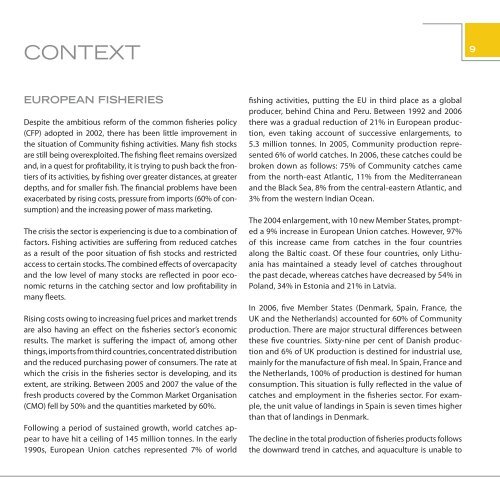language version - Europa
language version - Europa
language version - Europa
You also want an ePaper? Increase the reach of your titles
YUMPU automatically turns print PDFs into web optimized ePapers that Google loves.
CONTEXT<br />
EUROPEAN FISHERIES<br />
Despite the ambitious reform of the common fisheries policy<br />
(CFP) adopted in 2002, there has been little improvement in<br />
the situation of Community fishing activities. Many fish stocks<br />
are still being overexploited. The fishing fleet remains oversized<br />
and, in a quest for profitability, it is trying to push back the frontiers<br />
of its activities, by fishing over greater distances, at greater<br />
depths, and for smaller fish. The financial problems have been<br />
exacerbated by rising costs, pressure from imports (60% of consumption)<br />
and the increasing power of mass marketing.<br />
The crisis the sector is experiencing is due to a combination of<br />
factors. Fishing activities are suffering from reduced catches<br />
as a result of the poor situation of fish stocks and restricted<br />
access to certain stocks. The combined effects of overcapacity<br />
and the low level of many stocks are reflected in poor economic<br />
returns in the catching sector and low profitability in<br />
many fleets.<br />
Rising costs owing to increasing fuel prices and market trends<br />
are also having an effect on the fisheries sector’s economic<br />
results. The market is suffering the impact of, among other<br />
things, imports from third countries, concentrated distribution<br />
and the reduced purchasing power of consumers. The rate at<br />
which the crisis in the fisheries sector is developing, and its<br />
extent, are striking. Between 2005 and 2007 the value of the<br />
fresh products covered by the Common Market Organisation<br />
(CMO) fell by 50% and the quantities marketed by 60%.<br />
Following a period of sustained growth, world catches appear<br />
to have hit a ceiling of 145 million tonnes. In the early<br />
1990s, European Union catches represented 7% of world<br />
fishing activities, putting the EU in third place as a global<br />
producer, behind China and Peru. Between 1992 and 2006<br />
there was a gradual reduction of 21% in European production,<br />
even taking account of successive enlargements, to<br />
5.3 million tonnes. In 2005, Community production represented<br />
6% of world catches. In 2006, these catches could be<br />
broken down as follows: 75% of Community catches came<br />
from the north-east Atlantic, 11% from the Mediterranean<br />
and the Black Sea, 8% from the central-eastern Atlantic, and<br />
3% from the western Indian Ocean.<br />
The 2004 enlargement, with 10 new Member States, prompted<br />
a 9% increase in European Union catches. However, 97%<br />
of this increase came from catches in the four countries<br />
along the Baltic coast. Of these four countries, only Lithuania<br />
has maintained a steady level of catches throughout<br />
the past decade, whereas catches have decreased by 54% in<br />
Poland, 34% in Estonia and 21% in Latvia.<br />
In 2006, five Member States (Denmark, Spain, France, the<br />
UK and the Netherlands) accounted for 60% of Community<br />
production. There are major structural differences between<br />
these five countries. Sixty-nine per cent of Danish production<br />
and 6% of UK production is destined for industrial use,<br />
mainly for the manufacture of fish meal. In Spain, France and<br />
the Netherlands, 100% of production is destined for human<br />
consumption. This situation is fully reflected in the value of<br />
catches and employment in the fisheries sector. For example,<br />
the unit value of landings in Spain is seven times higher<br />
than that of landings in Denmark.<br />
The decline in the total production of fisheries products follows<br />
the downward trend in catches, and aquaculture is unable to<br />
9

















